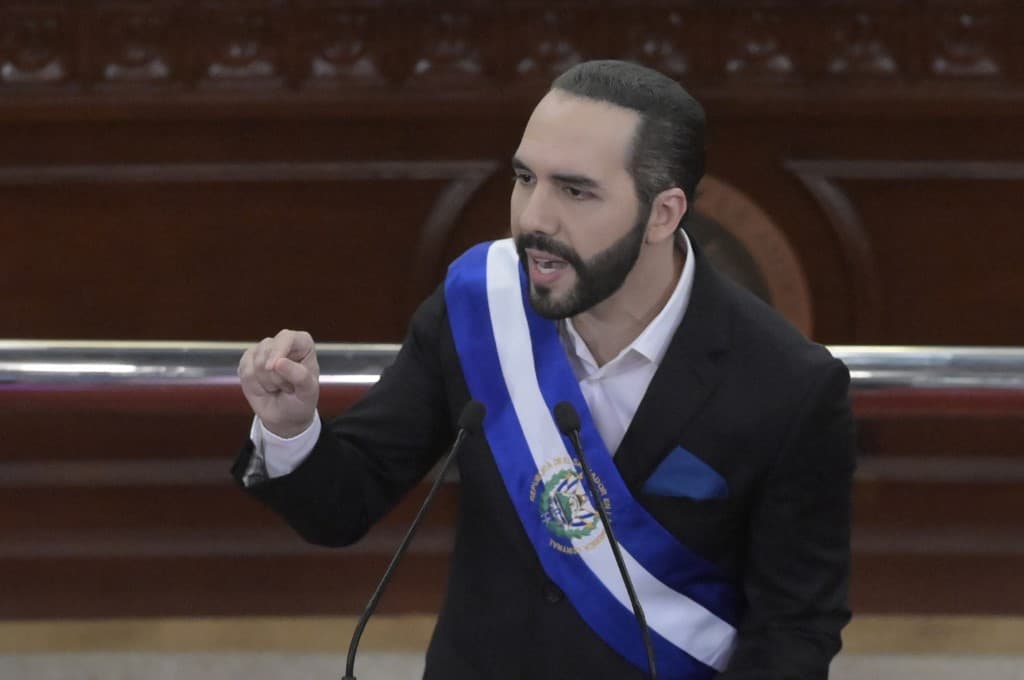A reform that paves the way for El Salvador’s President Nayib Bukele to amend the Constitution was described this Tuesday by jurists, analysts, and activists as a step towards a “dictatorial scheme” due to the lack of “counterbalance.”
The Congress, dominated by the president’s party, approved on Monday a constitutional rule change to accelerate future amendments to the constitution, which can now be ratified by the same legislature. The Constitution, in force since 1983, stipulated that any amendment had to be endorsed in a second legislative period.
This reform will allow for the “re-foundation of this country,” according to a ruling party deputy, but critics argue that during his new term, Bukele will be able to change the Constitution “at will,” without any “counterbalance.”
“It seems to me that the country is heading towards the consolidation of a dictatorial scheme with a greater concentration of power,” said political analyst and former guerrilla commander Eugenio Chicas.
To come into effect, this amendment must be ratified by the new legislature that is installed this Wednesday, which is taken for granted, as Bukele’s party will have a large majority.
“The president has free rein to push forward the measures he desires, without anyone to counterbalance him,” said independent analyst Carlos Araujo, stating that Bukele will be able to approve “constitutional reforms at his whim, without analysis, without discussion.”
The reform, approved on the penultimate day of the outgoing Congress’s period, establishes that changes can be approved directly “with the vote of three-quarters” of the deputies. In the new Congress, the ruling party New Ideas will have 54 (90%) of the 60 deputies.
Bukele was re-elected on February 4 with 85% of the votes for a new five-year term, favored by his “war” against the gangs, which has restored security to the streets. The Constitution prohibited re-election, but a sympathetic court enabled Bukele to seek a new term.
Weakens Democracy
The outgoing Congress President, ruling party member Ernesto Castro, defended the reform by claiming that “the section of article 248 referring to the form and system of government was neither touched nor reformed.”
However, constitutionalist Francisco Bertrand Galindo indicated that the amendment would allow Bukele to “make a plan of action for reforms” that will “undoubtedly” be approved by the new Congress. “With a majority of that level, he can do, by this means of approval and ratification, anything,” Bertrand Galindo told local television.
“The approved constitutional reform weakens democracy, the rule of law, and also the democratic institutions of the country,” declared Ramón Villalta from the NGO Social Initiative for Democracy.
A retreat
Analyst Araujo considered that with this reform, Bukele “has taken the reins in the state organs” for his new term, which begins on June 1. “In my opinion, what we are in is a retreat from the democratic advances established by the peace agreements” of 1992, which ended a 12-year civil war, emphasized former commander Chicas.
“A reform like this represents a setback because it takes away from the sovereign [the people] the possibility to influence the constitutional reform process and leaves it in the hands of a political group to transform the state,” he added.
Meanwhile, eleven civil society organizations declared themselves “concerned” about the reform, as they believe it will lead to a “concentration of power” that will leave Salvadorans exposed to “abuses by the state.”
For the leader of the New Ideas party bloc, Christian Guevara, it is necessary to “carry forward” reforms to the constitution to “improve and adapt it” to new times.
“We are here because it is the demand of the Salvadoran people to change things, to re-found this country, and that is what is needed and that is what we are going to do,” said Deputy Castro.






